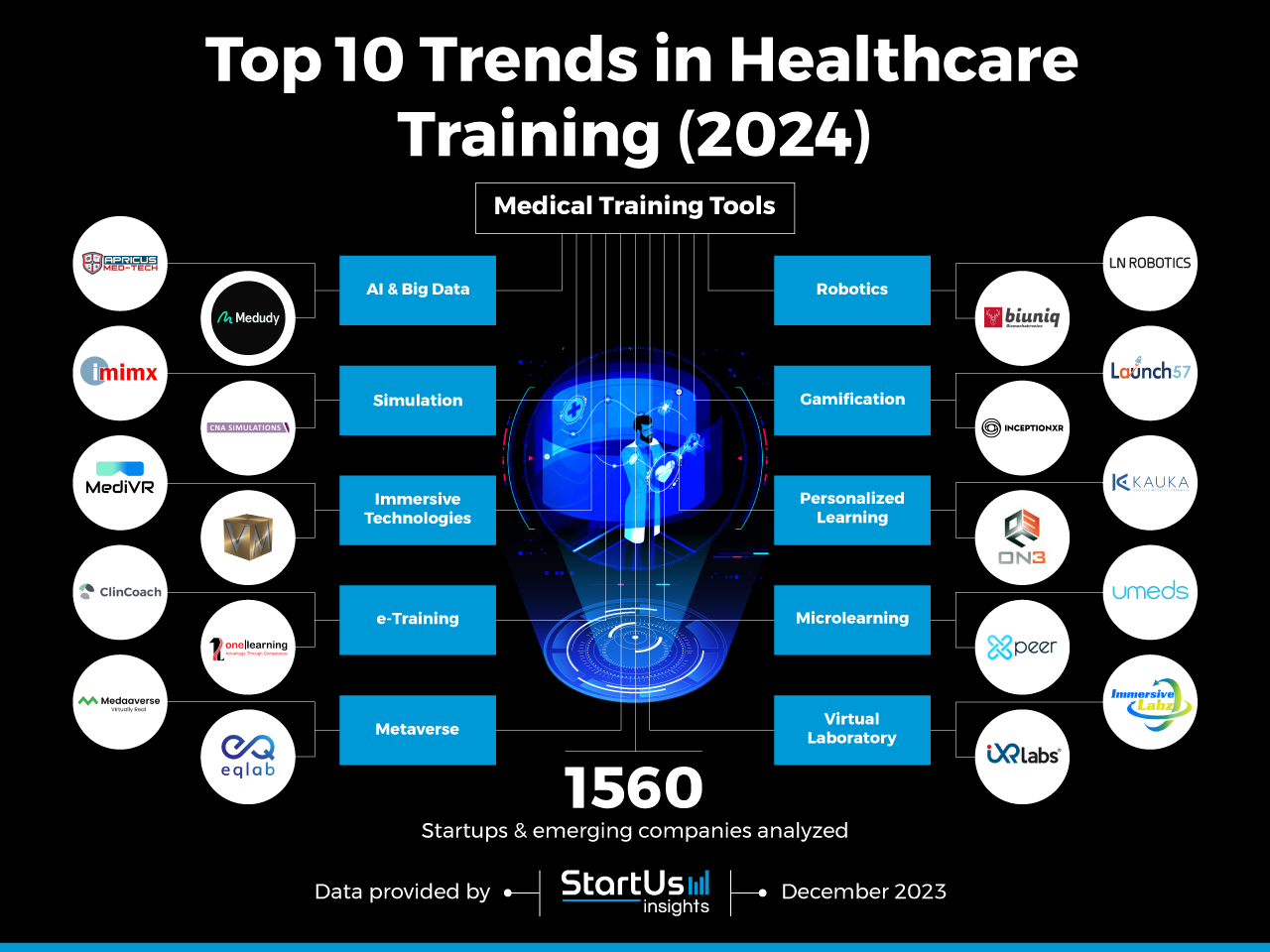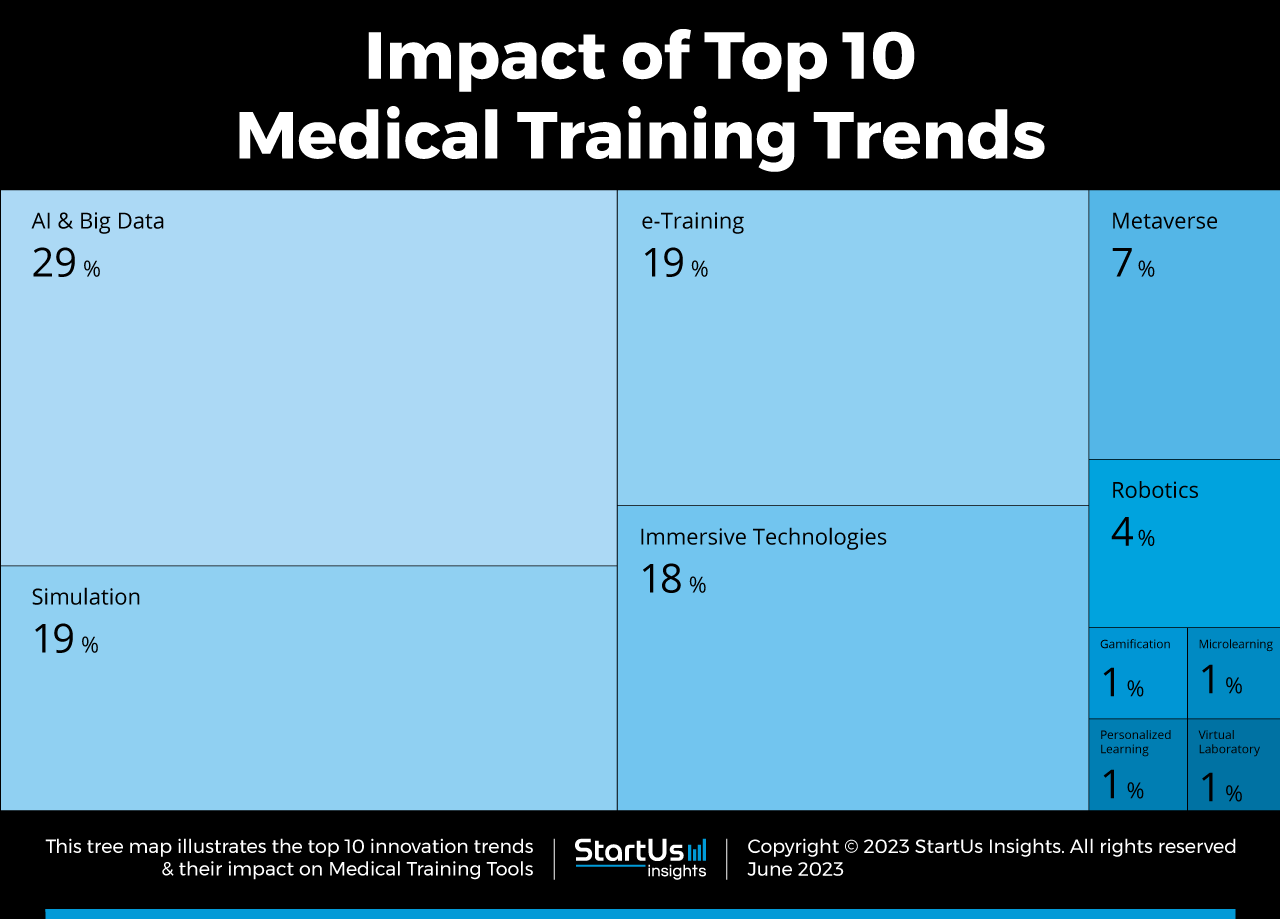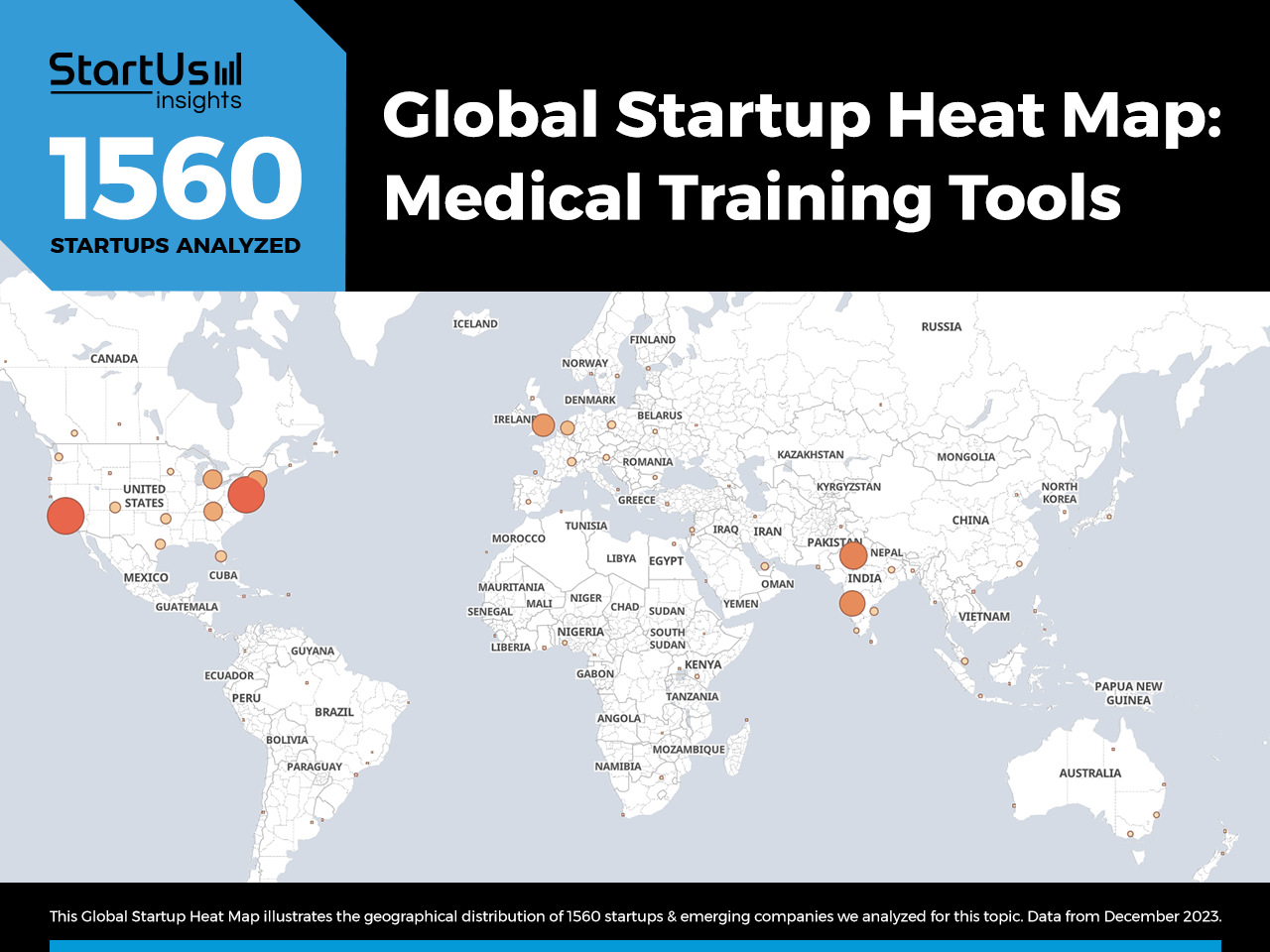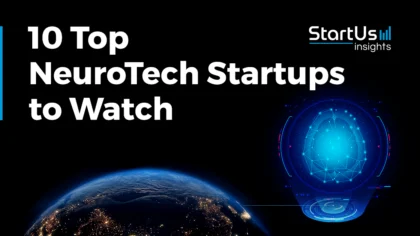Accelerate Productivity in 2025
Reignite Growth Despite the Global Slowdown
Medical training plays a critical role in preparing healthcare professionals to provide high-quality care and improve patient safety. Advances in technology are transforming the way medical training is approached, opening up new possibilities for immersive and effective learning experiences. As technology continues to advance at a rapid pace, so too does its integration into medical education and training. This research delves into the top 10 medical training tool trends in 2024, offering valuable insights based on an extensive analysis of 1560 startups operating in the healthcare sector. The trends in healthcare training include AI and machine learning (ML), immersive technologies, advanced robotics, and more. Read more to explore each trend and how they impact medical training.
Innovation Map outlines the Top 10 Healthcare Training Trends & 20 Promising Startups
For this in-depth research on the Top 10 Trends in Healthcare Training, we analyzed a sample of 1560 global startups & scaleups. This data-driven research provides innovation intelligence that helps you improve strategic decision-making by giving you an overview of emerging technologies in the healthcare industry. In the Healthcare Training Innovation Map below, you get a comprehensive overview of the innovation trends & startups that impact your company.
These insights are derived by working with our Big Data & Artificial Intelligence-powered StartUs Insights Discovery Platform, covering 3 790 000+ startups & scaleups globally. As the world’s largest resource for data on emerging companies, the SaaS platform enables you to identify relevant technologies and industry trends quickly & exhaustively.
Tree Map reveals the Impact of the Top 10 Healthcare Training Trends
Based on the Healthcare Training Innovation Map, the Tree Map below illustrates the impact of the Top 10 Healthcare Training Trends in 2024. AI & big data improve enhanced diagnostic accuracy and enable personalized learning. Simulations and immersive technologies provide safe practice environments. This includes the use of virtual reality (VR) and augmented reality (AR) for immersive training experiences.
E-training platforms also make medical training more accessible and drive self-paced learning while the metaverse offers collaborative virtual training. Additionally, robotics delivers hands-on surgical training and gamification increases patient engagement. Personalized learning, micro-learning, and virtual laboratories enable remote experimentation and improve knowledge retention. These trends highlight the transformative potential of medical training tools, allowing healthcare professionals to acquire knowledge and skills to improve patient care.
Top 10 Medical Training Trends (2024)
- AI & Big Data
- Simulation
- Immersive Technologies
- e-Training
- Metaverse
- Robotics
- Gamification
- Personalized Learning
- Microlearning
- Virtual Laboratory
Global Startup Heat Map covers 1560 Healthcare Training Tool Startups & Scaleups
The Global Startup Heat Map below highlights the global distribution of the 1560 exemplary startups & scaleups that we analyzed for this research. Created through the StartUs Insights Discovery Platform, the Heat Map reveals high startup activity in the US and India, followed by the UK. Below, you get to meet 20 out of these 1560 promising startups & scaleups as well as the solutions they develop. These emerging medical training companies are hand-picked based on criteria such as founding year, location, funding raised, & more. Depending on your specific needs, your top picks might look entirely different.
Top 10 Trends in Healthcare Training (2024)
1. AI & Big Data
AI-powered simulations provide realistic training scenarios to improve clinical skills. Big data analytics inform curriculum development, aligning training with real-world trends. Machine learning algorithms also generate personalized learning paths to optimize knowledge acquisition. Virtual patients, powered by AI, allow trainees to practice diagnosis and treatment. At the same time, big data streamlines competency tracking, trainee progress, and proficiency assessments. The role of AI and big data in medical training extends to continuous professional development by offering up-to-date medical knowledge. It also supports a shift towards more personalized, data-driven, and effective medical education.
Apricus Med-tech provides Continued Medical Education Programs
UK startup Apricus Med-tech develops MED-GURU LEP, a learning management platform. This platform diverges from traditional learning management system (LMS) platforms by offering a fully immersive learning experience through AR, AI, and gamification. MED-GURU LEP caters specifically to the needs of medical students and practicing physicians. It also provides continuing medical education (CME) programs for physicians to enhance their professional performance. The platform’s immersive learning methodologies simplify complex medical topics, making learning enjoyable and accessible.
Medudy offers a Medical Education Streaming Platform
German startup Medudy offers a platform for streaming current medical knowledge through concise videos. The platform provides guideline-based content on demand, accessible via desktop, smartphone, or tablet. It features CME-certified video courses, practical summaries of current studies, and partnership courses with pioneers in the medical field. The content undergoes multi-level quality assurance processes to ensure scientific accuracy and relevance. Physicians worldwide benefit from this platform, gaining access to top expert knowledge in their native language.
2. Simulation
Simulations provide a safe and controlled environment for learning. The healthcare industry is employing spatial computing and AI to deliver high-fidelity simulations. These simulations mimic real-life medical scenarios for trainees to practice and refine their skills. AI-powered virtual patients allow trainees to diagnose and treat a wide range of conditions. Haptic technology further offers tactile feedback to enhance the realism of surgical simulations. Simulations also prepare trainees for emergencies, fostering quick decision-making skills. Simulations also extend to team-based exercises to promote effective communication and collaboration.
IMIMX delivers Simulated Neonatal Care Training
IMIMX is an Egyptian startup that offers a range of patient simulators for medical training. Its ADAM-X series of adult patient simulators are designed for various levels of life support training. The LAP-X series provides virtual reality simulators for motor skills training in different surgical specialties. Further, the NENASim series focuses on neonatal patient care, offering simulators that represent newborns to preterm babies. These simulators serve as valuable tools for healthcare professionals to enhance their skills and improve patient care.
CNA Simulations advances Interactive Clinical Learning
CNA Simulations is a US-based startup that makes a platform for virtual, self-paced nursing assistant simulation scenarios. The platform features interactive games in realistic environments, helping students translate theory into clinical competencies. It also instills empathy and compassion for older adults through responsive virtual clinical simulations. The platform’s science-based simulations help students grow their confidence and capacity for high-quality care. This approach to medical training benefits nursing assistant students by enhancing their critical thinking skills and preparing them for real-world scenarios.
3. Immersive Technologies
Medical startups harness are leveraging VR and AR to create immersive learning experiences. VR simulations offer realistic surgical training environments and enable trainees to practice procedures and improve proficiency. AR overlays digital information onto the real world, enhancing anatomy education and assisting in surgical navigation. Immersive technologies also facilitate collaborative learning by enabling remote collaboration and knowledge sharing among medical professionals.
MediVR develops AI Virtual Humans for Medical Education
Singaporean startup InteractAI offers a platform that uses AI virtual humans for immersive medical training. These virtual humans engage in dynamic conversations, from small talk to complex medical diagnostic questions. The platform also allows the customization of virtual humans, including complex patients with full medical histories. It benefits professionals across various fields, including doctors and medical professors, enhancing their training efficiency and students’ knowledge retention.
Veyond Metaverse works on an Extended Reality (XR) Training Platform
US startup Veyond Metaverse develops an XR platform for enhancing healthcare education and training. The startup’s proprietary cloud communication platform enables seamless global engagement and collaboration, leveraging advanced cloud and communication capabilities. This advances medical education, surgical training, and patient treatments, enhancing medical procedures and diagnosis. The startup also provides real-time VR surgical training through its proprietary cloud 5G and 6G platform infrastructure. This benefits clinicians worldwide, improving surgical outcomes and the standard of care.
4. e-Training
Solutions for e-training transform the way healthcare professionals acquire and enhance their skills. The industry utilizes various technologies, including cloud computing, to deliver comprehensive online training. Such platforms deliver interactive modules for trainees and improve access to educational resources. Virtual classrooms also facilitate real-time collaboration and discussions among learners and instructors. Advanced e-learning platforms incorporate multimedia elements, such as videos and interactive simulations, to enrich the learning experience. Trainees actively participate in virtual patient case studies, strengthening their diagnostic and decision-making abilities. Additionally, telementoring and tele-precepting programs provide remote guidance and supervision.
ClinCoach provides Interactive Virtual Courses
ClinCoach is a German startup that offers online courses for clinical personnel and physicians, focusing on e-learning in medical training. The platform offers courses like ICH GCP Online Grundlagenkurs and ICH GCP Online Aufbaukurs, which are accessible anytime and anywhere. These courses are interactive, realistic, and constantly updated. Upon completion, participants receive a printable certificate for immediate participation in clinical studies. This allows healthcare professionals to ensure flexible, high-quality training for clinical research.
OneLearning Healthcare offers Ultrasound courses
Indian startup OneLearning Healthcare delivers online and offline ultrasound training courses for doctors. The startup’s platform provides a variety of courses, including courses on gynecology ultrasound, musculoskeletal ultrasound, and obstetrics ultrasound. It also offers a fetal therapy online course and a 3D/4D ultrasound course. These courses are taught by experienced ultrasound mentors, ensuring high-quality learning experiences.
5. Metaverse
Medical professionals harness immersive virtual environments to provide realistic and interactive training experiences. Trainees navigate through simulated medical scenarios, performing procedures and making critical decisions. Virtual patient encounters within the metaverse allow practice in diagnosing and treating various conditions. Collaborative learning is facilitated through virtual conferences and discussions, fostering knowledge exchange among medical professionals worldwide. Advanced technologies like VR and AR further empower lifelike environments and simulations for better training.
Medaaverse builds a 3D Human Anatomy Training Tool
Medaaverse is an Indian startup that improves traditional medical education and training using AR and VR. The startup’s platform features a 3D human anatomy tool that offers 3D animated content of all subjects for a comprehensive understanding of detailed anatomy. It also makes Meda-Lab, a virtual surgery lab that is accessible 24/7 for medical students to practice surgeries on virtual patients. This virtual lab also features real-time operation data, required surgical instruments, and a virtual guide. This metaverse approach to medical training benefits students and doctors by providing immersive, repeatable learning experiences.
EQLab Global designs a Metaverse-based Healthcare Simulator
US-based startup EQLab Global offers an immersive platform for visualizing potential career paths and reskilling in the medical field. The platform utilizes VR and AR to deliver intuitive modules on clinical skills. It features a unique concept called Ikigai 2.0 for career orientation, considering what users love, what the world needs, what users upskill for, and what AI cannot do. The platform also includes a Career Simulator, allowing users to experience different professional futures in VR. This metaverse approach to medical training benefits healthcare professionals by providing immersive, personalized career development experiences.

6. Robotics
Robotics improves skill acquisition and refinement for healthcare professionals. Medical training companies develop robotic systems for the precise practice of surgical procedures, enhancing dexterity and hand-eye coordination. Surgical simulators further provide realistic environments to develop procedural skills. Tele-mentoring programs facilitate remote guidance from expert surgeons through remote robotic control, promoting knowledge transfer without patient risks. Robotics in medical training tools enable specialized training, enhance procedural proficiency, and contribute to continuous professional development.
LN Robotics offers Robotic Cardiovascular Intervention Assistance
South Korean startup LN Robotics makes AVIAR, a cardiovascular intervention assist robot system. It combines AI, big data, robotics, and biomaterials to improve intervention procedures and reduce radiation exposure. The design features a haptic interface and a multi-channel mechanism for the simultaneous operation of two guidewires. It reduces inter-operator variance and enhances safety and efficiency during procedures. This robotics approach benefits clinicians by providing augmented situation awareness and reducing radiation exposure.
Biuniq builds a Robot for Telerehabilitation Training
Turkish startup Biuniq Technology develops biomechatronics devices that synchronize humans and robots for various applications. The startup’s SINA is a hand telerehabilitation robot and PUYA is an IoT-based hand exoskeleton and haptic glove. These devices are designed for use in telerehabilitation. They enhance the quality of training, improve the experience with haptic feedback, and enable telecontrol of robotic arms. The startup offers medical training benefits to healthcare professionals, enhancing their skills and improving patient care.
7. Gamification
Gamified platforms offer interactive modules and challenges to foster engagement and motivation. Virtual patient simulations allow trainees to practice clinical decision-making in realistic scenarios while leaderboards and rewards encourage healthy competition among learners. Mobile applications and online platforms also provide accessible and on-the-go learning opportunities. Gamification facilitates knowledge retention through quizzes, trivia, and interactive content. Further, collaborative gamification promotes teamwork and communication skills development.
Launch57 creates a Virtual Patient Care Module
Canadian startup Launch57 offers Learning Inter-Professionally Healthcare Accelerator (LIPHA), a gamified training platform for healthcare professionals. It provides a virtual space with simulated cases and an educational game for healthcare teams and individuals. This allows learners to practice caring for virtual patients or residents in a simulated environment. The platform is designed for post-secondary nursing education, long-term care homes, and healthcare aides. Its gamified approach benefits nursing students, healthcare aides, and personal support workers by providing immersive, realistic training scenarios.
InceptionXR delivers XR-based Simulated Medical Training
US-based startup InceptionXR provides healthcare training through immersive XR experiences. The startup’s platform offers a variety of applications, including training for nurses and physicians, simulation of complex medical procedures, and education for pharma companies and medical professionals. It also features a CDC-funded Infection Prevention and Control (IPC) application for nurses, providing an engaging way to access the CDC curriculum. The platform’s versatility allows for the transformation of any content into a vivid, multisensory immersive experience. Healthcare professionals use the startup’s solution as it enhances learning results, boosting knowledge retention and reducing training expenses.
8. Personalized Learning
Personalized learning provides tailored education to individual healthcare professionals. Adaptive learning platforms utilize AI algorithms to customize educational content based on learners’ needs and progress. These platforms also utilize data analytics to track learner performance and offer tailored feedback and improvement recommendations. Moreover, mobile applications offer on-demand access to personalized learning resources.
KaukaVR builds Customized Medical Practice Simulation Tools
Spanish startup KaukaVR makes VR-based customized medical practice simulation tools. The company’s platform features virtual reality training capsules that simulate specific healthcare processes. These capsules are executed in training mode, with step-by-step guidance, or in evaluation mode, where learners overcome challenges independently. Through its SAVI platform, KaukaVR provides a learning evaluation system and a tool for instructors to track students’ progress. This benefits healthcare professionals by improving their speed and reducing errors, enhancing the overall quality of healthcare services.
On3 advances AI-based Personalized Learning
On3 is a US-based startup that provides technology-based learning solutions, offering a mobile-first, AI-driven platform for frontline employees. The platform includes features for creating and delivering customized learning content, such as digital flashcards, checklists, guides, diagrams, pictures, and videos. It utilizes an AI algorithm to personalize learning based on each employee’s competency level and physical location. On3’s platform also allows for feedback and coaching on videos submitted by field employees. This personalized approach to medical training benefits healthcare professionals by improving quality, reducing warranty expenses, and speeding up new employee onboarding.
9. Microlearning
Microlearning offers efficient and flexible knowledge acquisition methods in medical training. It provides bite-sized educational content for focused learning. Microlearning modules are also accessible through mobile applications and online platforms to enable on-the-go access to learning resources. This just-in-time learning approach supports clinical decision-making and procedural techniques. Microlearning is widely applied in areas such as anatomy education. It allows healthcare professionals to optimize their time, reinforce learning, and stay updated with the latest medical advancements.
UMEDS offers a Dental & General Medicine Learning Platform
Indonesian startup UMEDS develops a comprehensive platform for dental and general health education, offering synchronous and asynchronous learning materials. The platform features live classes on a variety of topics, allowing students to deepen their understanding of basic and clinical dental medicine. UMEDS also offers subscription packages for video lessons and learning modules, making it easier for students to learn. The platform’s content is designed specifically for learning, with adaptive learning videos, summaries, and infographic modules. Beneficiaries of this platform include dental students and professionals seeking to enhance their knowledge and skills in a flexible and user-friendly environment.
Xpeer provides Credit-based Microlearning
Spanish startup Xpeer is a platform that provides accredited medical education videos for healthcare professionals. It offers a variety of courses across multiple specialties, available in 12 languages. Xpeer’s approach to microlearning involves delivering knowledge in credit-based digestible chunks. The platform also includes a community feature, that allows healthcare professionals to connect, share experiences, and learn from each other. It thus provides a flexible, user-friendly, and accredited environment for medical learning.
10. Virtual Laboratory
Virtual laboratories provide realistic and interactive hands-on medical training experiences. They simulate various medical procedures and allow trainees to practice and develop their skills. Virtual laboratory platforms also incorporate interactive simulations for trainees to perform experiments and analyze results. Augmented and virtual reality technologies enhance the immersive experience, providing a sense of realism. Trainees practice immersive techniques such as suturing, phlebotomy, and microscopy in a risk-free environment. Virtual laboratories also facilitate collaborative learning, enabling trainees to work together on projects and share knowledge.
Immersive Labz builds a 3D Virtual lab for Medical Training
Indian startup Immersive Labz, a deep-tech company, advances practical science education with advanced technologies. Its product, SimuLab, is a 3D virtual science lab that enables students to learn and practice science experiments in a gamified way. Another product, Cadaviz, is a virtual human dissection table that delivers detailed visualization of human anatomy. Both products, combined with AI, AR, and VR, enhance learning experiences. The startup’s solutions benefit students and educators alike, offering a more engaging and effective approach to science education.
iXRLabs offers Immersive Medical Procedure Training
iXRLabs is an Indian startup that provides immersive virtual reality labs for medical education. Its platform includes modules for exploring medical devices, human body organs, and surgical procedures. The medical device module allows for detailed exploration and understanding of device function and application while the human body organs module provides an in-depth view of organ structure and function. Medical students and professionals use the platform to gain proficiency and confidence in performing procedures and understanding medical devices and human anatomy. This provides a safe and controlled environment for mastering disease diagnosis and surgical procedures.
Discover all Healthcare Training Trends, Technologies & Startups
Medical training tools are at the forefront of leveraging technology to shape the future of healthcare education. Simulation and immersive technologies create safe and realistic practice environments while e-training platforms offer accessible and enable self-paced learning. Personalized learning tailors educational experiences to individual needs. These technologies allow healthcare professionals to acquire essential skills and knowledge, ultimately leading to higher proficiency and better patient outcomes. The trends in medical training & startups outlined in this report only scratch the surface of trends that we identified during our data-driven innovation & startup scouting process. Identifying new opportunities & emerging technologies to implement into your business goes a long way in gaining a competitive advantage.










